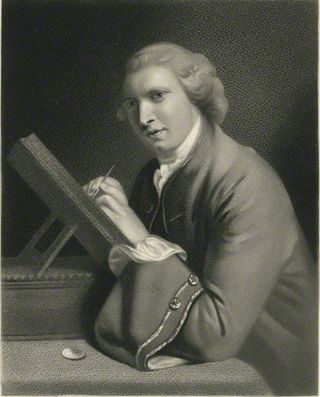Related Research Articles
Nathan Bailey, was an English philologist and lexicographer. He was the author of several dictionaries, including his Universal Etymological Dictionary, which appeared in some 30 editions between 1721 and 1802. Bailey's Dictionarium Britannicum was the primary resource mined by Samuel Johnson for his Dictionary of the English Language (1755).
The Plumian chair of Astronomy and Experimental Philosophy is one of the major professorships in Astronomy at Cambridge University, alongside the Lowndean Professorship. The chair is currently held at the Institute of Astronomy in the University. The Plumian chair was founded in 1704 by Thomas Plume, a member of Christ's and Archdeacon of Rochester, to "erect an Observatory and to maintain a studious and learned Professor of Astronomy and Experimental Philosophy, and to buy him and his successors utensils and instruments quadrants telescopes etc."

John Worlidge or John Woolridge (1640–1700) was a noted English agriculturalist, who lived in Petersfield, Hampshire, England. He was considered a great expert on rural affairs, and one of the first British agriculturalists to discuss the importance of farming as an industry.
Joshua Hoyle was a Professor of Divinity at Trinity College, Dublin and Master of University College, Oxford during the Commonwealth of England.

Richard Yeo was a British medalist and Chief Engraver at the Royal Mint, in which capacity he supplied patterns for the guinea and five guinea coins of George III. He was a founding member of the Royal Academy of Art, and appears in the group portrait by John Zoffany.
John Kersey the younger was an English philologist and lexicographer of the late seventeenth and early eighteenth centuries. He is notable for editing three dictionaries in his lifetime: A New English Dictionary (1702), a revised version of Edward Phillips' The New World of English Words (1706) and the Dictionarium Anglo-Britannicum (1708).

The New College at Hackney was a dissenting academy set up in Hackney in April 1786 by the social and political reformer Richard Price and others; Hackney at that time was a village on the outskirts of London, by Unitarians. It was in existence from 1786 to 1796. The writer William Hazlitt was among its pupils, sent aged 15 to prepare for the Unitarian ministry, and some of the best-known Dissenting intellectuals spent time on its staff.

William Jackson, referred to as Jackson of Exeter, was an English organist and composer.

Frodsham Hodson (1770–1822) was an English churchman and academic, the Principal of Brasenose College, Oxford, from 1809.
John Glover (1714–1774) was an English preacher and writer.

James Stow, was an English engraver.
George Hall was an academic at Trinity College Dublin, who served as the fourth Erasmus Smith's Professor of Mathematics from 1799 to 1800, as Provost of the college from 1806 to 1811, and the Church of Ireland Bishop of Dromore for a few days before his death in 1811.

Edward Penny was an English portrait and historical painter, one of the founder members of the Royal Academy.

John Leicester, 1st Baron de Tabley was an English landowner, politician, amateur artist, and patron of the arts.

Joseph Benson was an early English Methodist minister, one of the leaders of the movement during the time of Methodism's founder John Wesley.
John Hakewill (1742–1791) was an English painter and interior decorator.
Thomas Ludford Bellamy (1770–1843) was an English singer, also for a time a theatre manager.

John Alcock was an English organist, who composed several songs between 1770 and 1780.
References
- ↑ Hoyle, John (1770). Dictionarium Musica. National Library of Australia. Retrieved 18 November 2010.
- ↑ Sharp, Robert Farquharson (1891). . In Lee, Sidney (ed.). Dictionary of National Biography . Vol. 28. London: Smith, Elder & Co.
citing: [Grove's Dict. of Music, i. 755.]
- Attribution
. Dictionary of National Biography . London: Smith, Elder & Co. 1885–1900.